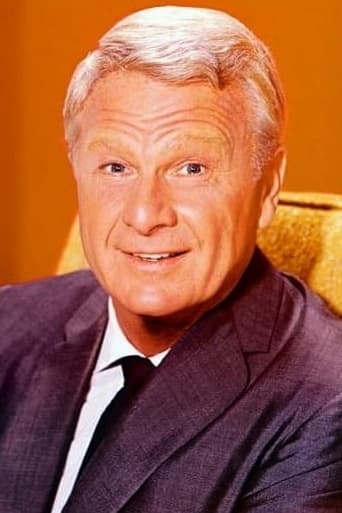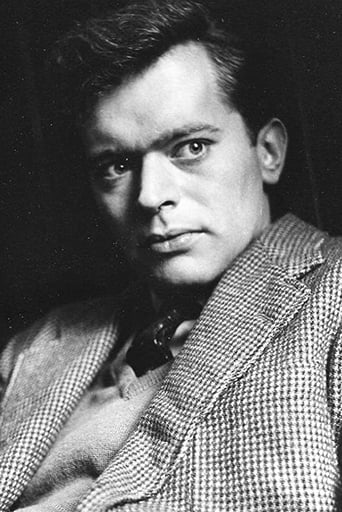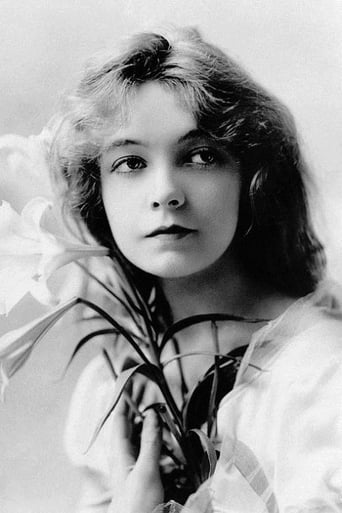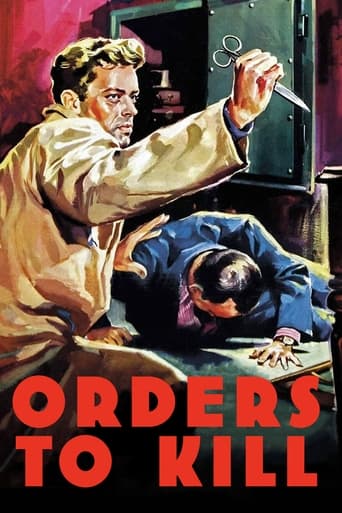
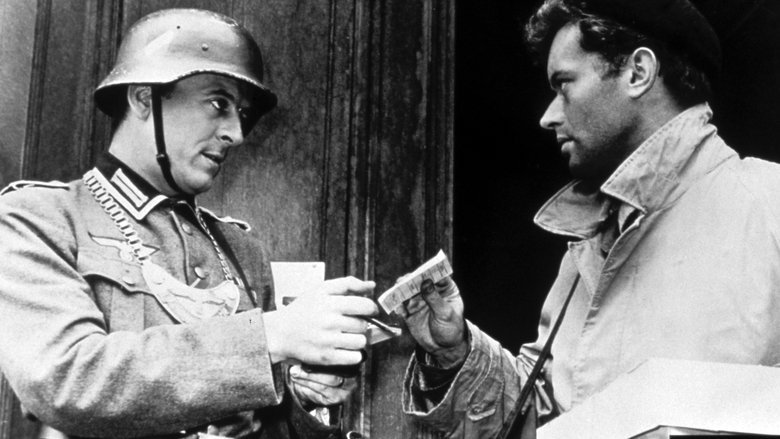
Orders to Kill (1958)
A grounded American fighter pilot is switched to espionage on a special job in which he must kill a small-time Paris lawyer suspected of double-crossing France by selling out radio operators to the Nazis.
Watch Trailer
Cast
Reviews
Sadly Over-hyped
For all the hype it got I was expecting a lot more!
There are moments that feel comical, some horrific, and some downright inspiring but the tonal shifts hardly matter as the end results come to a film that's perfect for this time.
One of the most extraordinary films you will see this year. Take that as you want.
ORDERS TO KILL looks and feels like a straightforward wartime thriller at the outset. It features Paul Massie (the Canadian actor best known for playing the lead in THE TWO FACES OF DR. JEKYLL, a role he no doubt got on the strength of his fine conflicted performance here) as an American agent who is parachuted into occupied France to take down a French traitor whose association with various resistance fighters has seen many of them die.During his early training scenes with the delightfully gruff James Robertson Justice, Massie seems like the ideal man for the job. Things are a little different in the field: he soon finds himself questioning the man's guilt, and ORDERS TO KILL becomes a very different type of film all of a sudden: an intense 'moral dilemma' movie which puts the protagonist and the viewers through the ringer.The only fault I can find with this film is that it's slightly overlong and some of the early scenes drag a little. Otherwise, it's a delight, and a surprisingly mature and brutal effort for the era. Some of the scenes are so suspenseful and disturbing that they're almost unwatchable. An exemplary supporting cast really add to the authenticity of the piece, but the whole thing hangs on Massie's shoulders and he doesn't disappoint; I think it's fair to say that he peaked early in his career and was never better than here. ORDERS TO KILL is a fine thriller without a single action scene in it to distract from the storyline.
This wartime tale directed by Anthony Asquith confronts full-on the essential moral dilemma of the necessity to commit murder in the cause of war. It does not take place on a battlefield, but in the starker situation of a covert assassination of a man believed to be compromising the Resistance Movement in occupied Paris. The man chosen to kill the suspected person is played by the young actor Paul Massie, aged 26. It was his first credited screen role, and he does an excellent job. For some reason, this highly talented and promising young actor never achieved the prominence in his career which he would seem to have deserved. After 1973, he only worked four times (the last time in 1996), and he died in 2011. The other film for which he will be remembered is SAPPHIRE (1959, see my review). The most powerful performance in this film was delivered by Irene Worth, as the character Léonie. Massie is sent to Paris to kill the suspect man, and Worth is his contact, with whom some very tense scenes indeed transpire. Worth's embittered intensity is very convincing and deeply disturbing. Lillian Gish appears briefly early on in the film as Massie's mother, but it is not a significant part. Eddie Albert is very good as a commanding officer, and James Robertson Justice has immense gravitas and a suitably ominous quality as the man who trains Massie how to kill an individual quietly and quickly by taking off a pair of long socks and turning them into a murder weapon. Leslie French is superb as the unfortunate Marcel Lafitte, who is wrongly suspected of having betrayed the Resistance, whereas he is not only innocent but a gentle, caring soul who loves his family and his cat and would not hurt a fly. The film is based on a novel by the American author Donald Downes, another of whose novels was filmed as THE PIGEON THAT TOOK ROME (1962). This film starts very slowly because Asquith and his writers are so keen to make their moral point that they dwell on the minutiae of Massie's recruitment and training to carry out his assignment. Today that would be sketched in a couple of minutes, but in this film it takes a long time. Once the action gets going, the film becomes very tense indeed, and finally it becomes very grim, as we face the moral dilemma. Asquith was clearly determined to make this film in this way because he was trying to examine the dilemma and drive home its insolubility. In a sense, we could call this fifties film a true existentialist film, in keeping with the prevailing philosophy of that Heidiggerian decade. It explores 'what a man must do' and the 'nausea' following his actions. It bears some resemblance to the concerns of André Malraux, who in the novel MAN'S FATE contemptuously says that anyone who has not killed someone face to face is 'a virgin'. One wonders if Jean-Paul Sartre visited the set, steeped in nausea, and whispered existential doubts into the ear of the director. Much of it is filmed on location in Paris, and there are some very fine and atmospheric location shots. This film evidently meant a great deal to Anthony Asquith, who had a social conscience which he wore somewhat on his sleeve, and we owe him the consideration of listening to his message, which after all is a very worrying one, even if we find it deeply disquieting.
Paul Massie, Eddie Albert, Leslie French, and Irene Worth star in "Orders to Kill," a 1958 film produced and directed by Anthony Asquith.Done in a low-key, realistic way, the story concerns a young American soldier, Gene Summers (Massie) who is chosen to go to France to kill an attorney who was a Resistance member, Lafitte (French) but has become a traitor. For Summers, it's an exciting assignment, and he relishes learning his new identity and being taught to kill either with his bare hands or by knife. One of the men in charge of his training, Major MacMahon (Albert) is afraid the ramifications of the job aren't real enough for him, but off he goes. His contact in France is Leonie (Irene Worth).All goes well until Summers actually meets LaFitte, who saves him from a Nazi roundup by hiding him in his office. When he sees that Lafitte seems like a gentle soul, he can't kill him. Then he meets LaFitte's daughter and wife. He appeals to Leonie -- maybe this man is innocent, maybe a further investigation is warranted. Leonie is a hard-nose and insists that he carry out his orders.Talky and slow-moving through a good deal of the film, it changes suddenly and becomes very suspenseful and exciting. Everyone underplays, making them somehow more realistic in their war-torn surroundings.Everyone is very good, but Irene Worth, a fantastic actress, Leslie French, and Eddie Albert are standouts. The workhorse role is Massie's, and he is very good in a role that required him to be extremely natural and even throughout.Very good.
I saw this film on the late show about 25 years ago & haven't seen it since but I still remember much of it vividly. A soldier is parachuted into occupied France during World War II & is "ordered to kill" a resistance leader who is believed to have been collaborating with the Nazis. However, as he works his way into the trust of his target, he begins to believe that he is a loyal Frenchman & not a Nazi sympathizer. He expresses his doubts to his superiors, but they order him to continue his mission. His decision & its consequences form the climax of the movie. Despite its obscurity, the film packs quite an emotional punch & I dearly wish I could see it again. Perhaps time has burnished its image in my mind, but I would rate this as a superior war movie.
